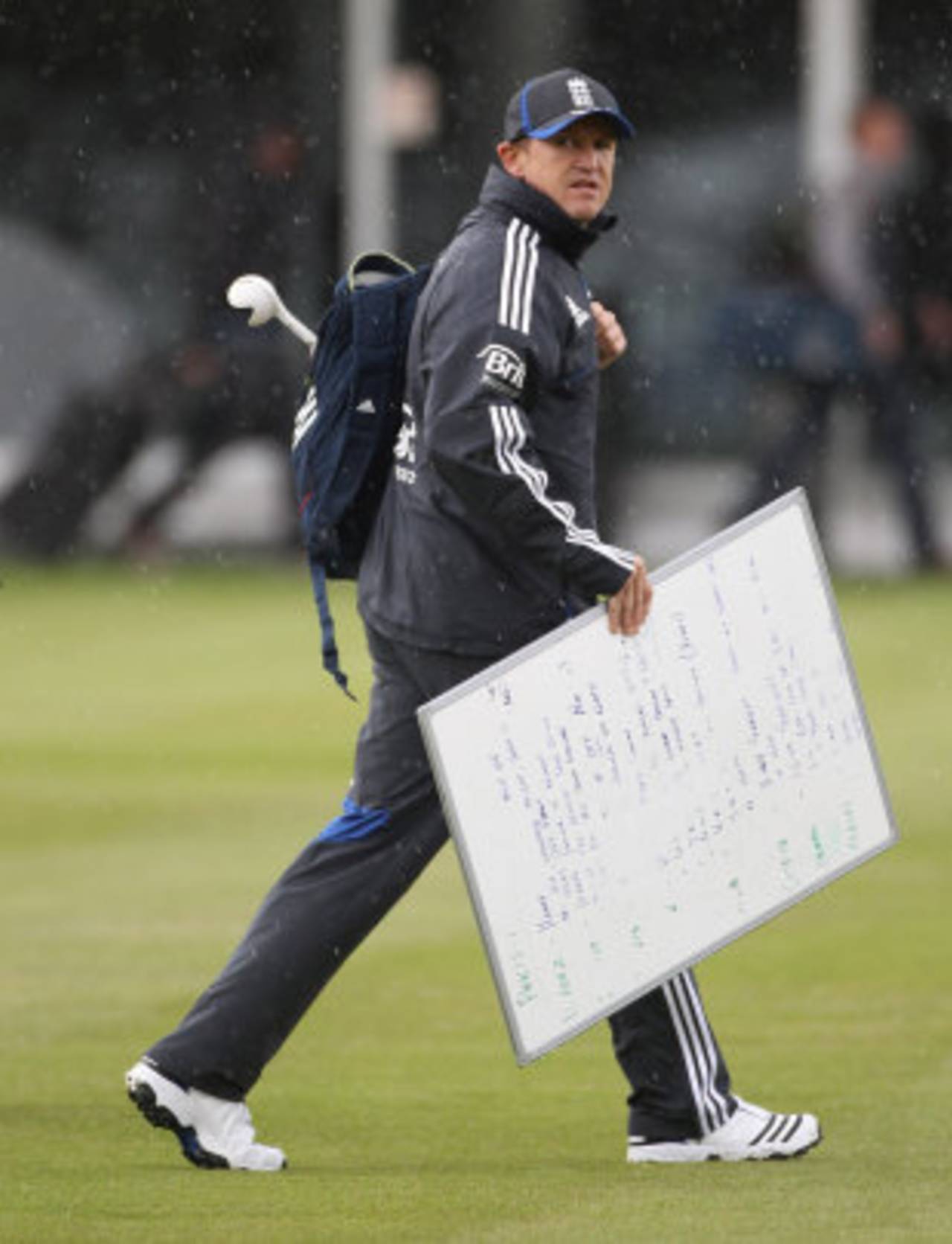Time to give Flower a break
Just as England's players benefit from rest and rotation, so Andy Flower's long-term future as director of cricket might be extended and enhanced if he enjoyed similar treatment.
George Dobell
Jul 12, 2012, 3:05 PM

When will England's white board have written on it a holiday for Andy Flower? • Getty Images
These are golden days for English cricket. After years of mediocrity, after years when success was the exception not the norm, after years of gallows humour, of early exits and embarrassing defeats, England are within an ace of becoming the top-rated side in all three formats of the game.
Whatever happened in the UAE, and whatever happens in the series against South Africa - there will be bumps in the road on any journey - English cricket has enjoyed a remarkable renaissance.
A key and enduring ingredient in that success has been Andy Flower. It is quite true that he has built on the work of others - the likes of Lord MacLaurin, Nasser Hussain, Duncan Fletcher, Micky Stewart, Michael Vaughan and David Lloyd all played their part - but Flower, with his planning, his dedication, his calm and his vision, has helped transform a side that was beaten 5-0 in the Ashes in 2006-07 to one that looks as if could inflict a similarly overwhelming victory over the same opposition next year.
Flower is a gem. He needs to be valued. To be nurtured. And, just as the players benefit from rest and rotation, so Flower's long-term future as coach might be extended and enhanced if he enjoyed similar treatment.
The topic is beginning to be discussed in senior circles in the ECB. The recognition is privately growing that England's non-stop schedule could one day lose a coach of inestimable value unless a solution is not only adopted, but vigorously defended.
Flower's schedule is relentless. This winter, for example, he will depart for Sri Lanka in September for the World T20. If England progress to the final of that, he will have about two weeks in England before departing for the tour of India and New Zealand which, but for eight days at Christmas, is unbroken until the end of March. This is a schedule that asks a great deal of any one. For a man with a wife and young children, it is a schedule that asks too much.
In The Plan, Steve James' study of how Fletcher and Flower have transformed English cricket, James recalls an interview that Flower gave a little more than a year ago. In it, he admits guilt that for most of the year he is an absentee father.
Flower said: "I'm not convinced I'm doing the right thing by the family by doing this job. I'm a bit greedy because I'm trying to get the best of both worlds by helping to raise a young family and also trying to make a difference with the England cricket team. I worry about the fact that this time can't be regained. I worry about the fact that the kids might at some stage resent me for being away during these years."
It is not just that the ECB - and, in particular Hugh Morris, the managing director of England cricket - have a duty of care towards Flower, it is that they should view resting him as an investment. If Flower, as he has hinted, walks away from the job in a year or two with a view to spending more time with his family, England will have a huge pair of shoes to fill.
But, if Flower is managed properly, if he is allowed more balance in his life, there is no reason to think he could not be fulfilling the same role in five or six years.
There are a couple of obvious opportunities to rest him. The ODI tour of India, which begins at the start of January, is in one option. The tour, though likely to be watched by many, has little relevance to future global ODI tournaments, with conditions in Asia markedly different to those for the next ICC Champions Trophy next year in England or the World Cup, to be played in Australia and New Zealand.
The Test tour of New Zealand provides another potential opportunity. While some will decry any suggestion that England are not prioritising Test cricket, it is also worth noting that it currently appears that several New Zealand players will miss the return tour due to their involvement in the IPL.
That only leaves the question of a substitute for Flower. While there are obvious candidates within the county games - Mick Newell, Ashley Giles, Chris Adams and Peter Moores all offer viable alternatives - the most likely man is already with the squad. Richard Halsall, ostensibly the fielding coach, has increasingly grown into the role of Flower's right-hand man and has already stood in for him when Flower was given a break for the ODI in Dublin in August 2011 and for two days of the first Ashes Test in Brisbane in November 2010 when Flower required surgery to remove a melanoma from below his right eye.
The benefit of Halsall is not only that he offers continuity - he knows the team, Flower's methods and would cause minimum disruption - but that his short-term promotion will not offer the complications that could arise if a new coach, with new methods, comes in to the role and enjoys immediate success.
George Dobell is a senior correspondent at ESPNcricinfo